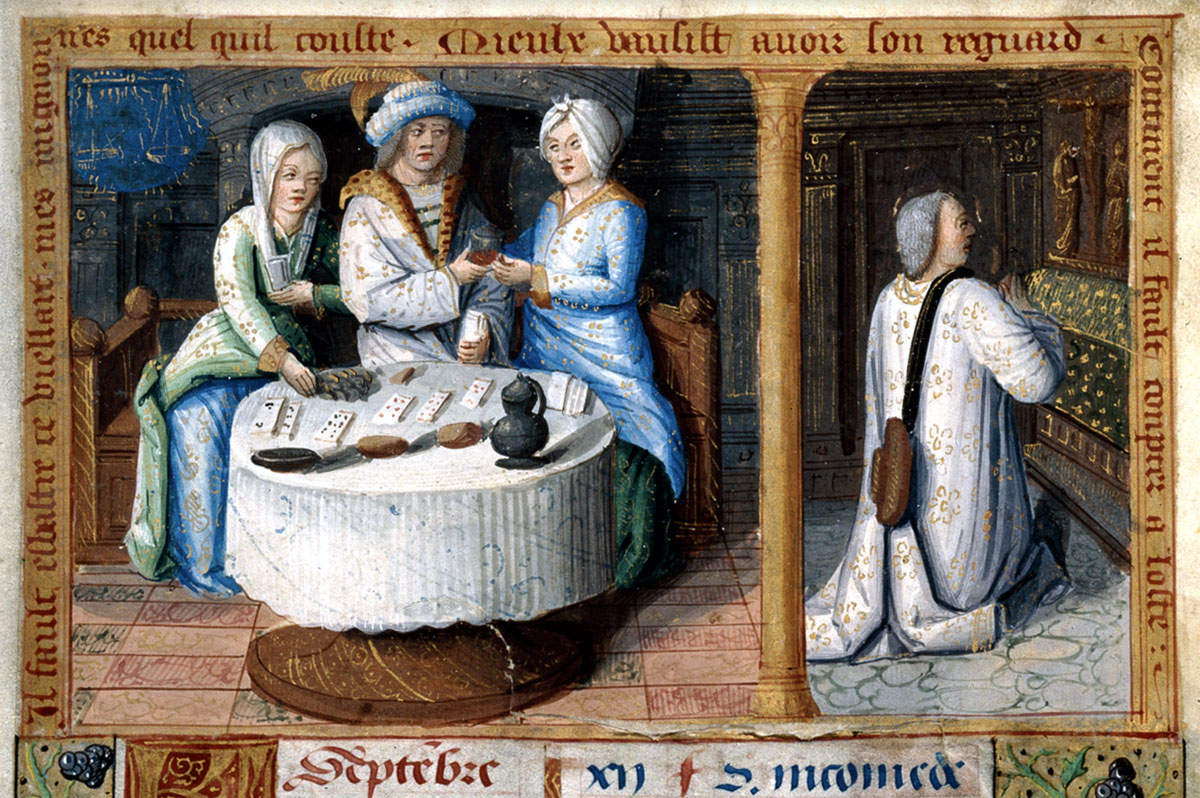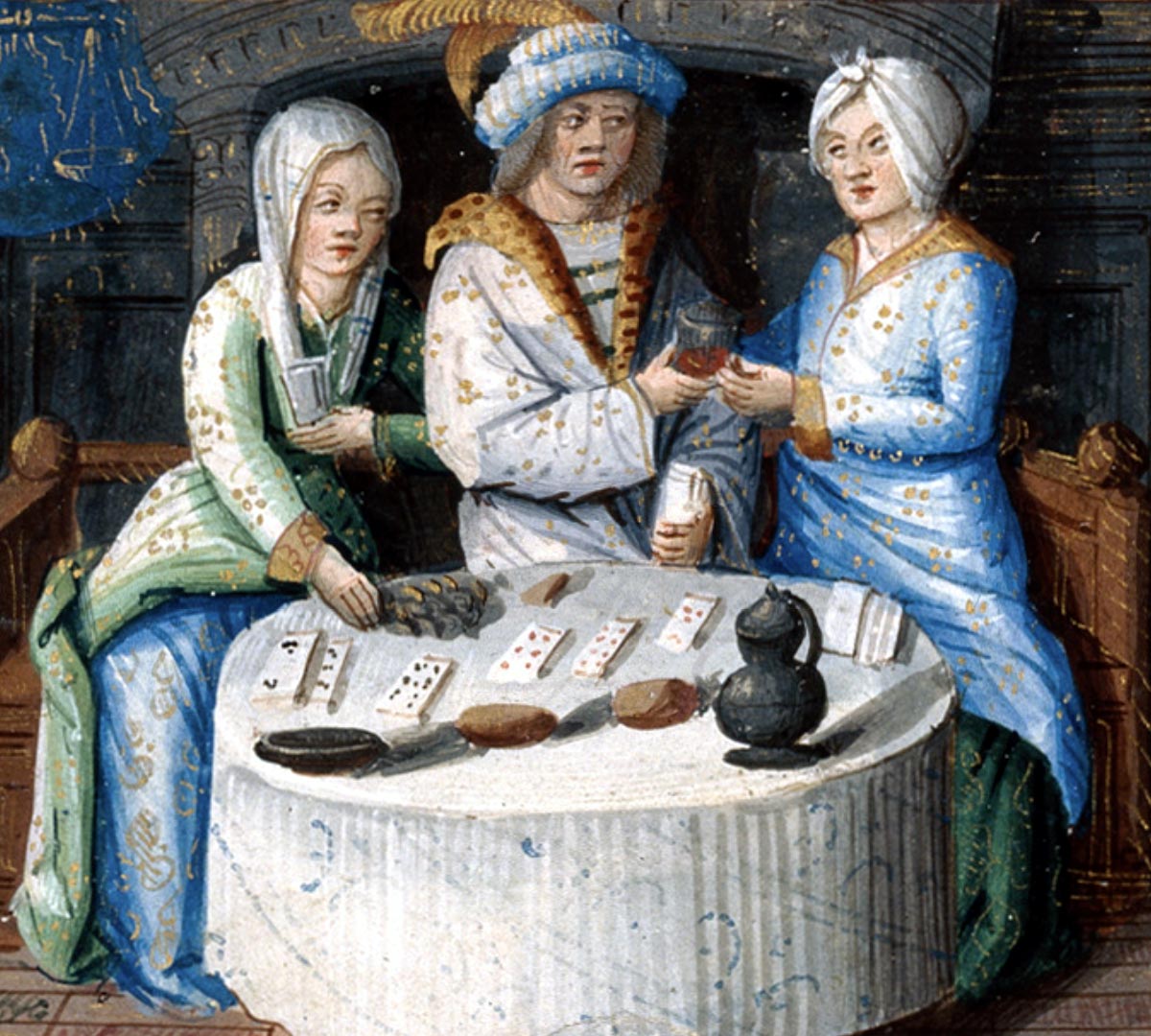Gambling and Vice in the Middle Ages
Gambling and Vice in the Hours of Charles V: card-playing in the local tavern
The month of September in the Book of Hours of Charles V, produced in Paris around 1500, has a miniature painting showing the sinner gambling accompanied by two women. Playing cards can be seen arranged on the table, along with money and other items. One of the women is distracting him whilst the other cheats. This is a frequent theme in Northern European medieval art. The moral message is that not only is he losing his soul but also all his goods, leading to misery. A libra sign is shown at the top left-hand corner. The right-hand miniature depicts salvation through prayer.

Above: detail from the month of September from Libro de horas de Carlos V, Biblioteca Nacional de España, online here► (click 13th thumbnail).
Apart from the theological meaning, the illustration offers what was most probably a typical scene in taverns or public houses of that time.

Above: the french artist has not painted much detail on the playing cards, but black and red pips can be seen on fairly elongated cards. The manner of holding the cards is one just above the other, in a single pile, rather than fanned out more →
Further Thoughts
“La primera conclusión es que todo el mundo jugaba a las cartas a pesar de que estaba prohibido jugar apostando”... more →
A late XV century engraving by the German engraver and goldsmith Israhel van Meckenem (c.1445 – 1503) also has a possible allegorical or moral interpretation. It shows a seated woman showing a playing card to a young man who seems slightly startled, raising his hand in surprise. The room is a detailed domestic scene with pitchers and other items. The rest of the pack of cards is on the table between them, but no coins or money.
The woman could be a fortune-teller using playing cards, which were associated with both games and divinatory practices during this period. The young man’s hand gesture suggesting surprise or concern possibly indicates moral confusion. The image might be a cautionary allegory warning about the perils of divination or other temptations, the youth being lured away from virtuous behaviour, led astray by superficial diversion.

Above: a late XV century engraving by the German engraver and goldsmith Israhel van Meckenem (c.1445 – 1503)

By Simon Wintle
Member since February 01, 1996
I am the founder of The World of Playing Cards (est. 1996), a website dedicated to the history, artistry and cultural significance of playing cards and tarot. Over the years I have researched various areas of the subject, acquired and traded collections and contributed as a committee member of the IPCS and graphics editor of The Playing-Card journal. Having lived in Chile, England, Wales, and now Spain, these experiences have shaped my work and passion for playing cards. Amongst my achievements is producing a limited-edition replica of a 17th-century English pack using woodblocks and stencils—a labour of love. Today, the World of Playing Cards is a global collaborative project, with my son Adam serving as the technical driving force behind its development. His innovative efforts have helped shape the site into the thriving hub it is today. You are warmly invited to become a contributor and share your enthusiasm.
Related Articles

Tarot de las Coscojas
Historical playing card design, tarot symbolism and an almost psychedelic medieval surrealism.

Tarot de Valverde de la Vera
A series of 24 surrealist engravings by Mexican artist Claudio Favier in which archetypal Tarot alle...

Briefmarken-Quartett
Quartet game featuring postage stamps from the Zones of Occupation in post-WWII Germany.

Never Mind the Belote
Limited edition Belote pack with designs by a collective of 24 street artists.

Sannois dans les étoiles
Celebrities and buildings associated with Sannois, a commune in the suburbs of Paris.

Le Globe Céleste
Views and plans of five international exhibitions held in Paris between 1855 and 1900.

IG Chemie Papier Keramik
Promotional pack designed by Karl-Heinz Schroers for a German trade union with comical bears on the ...

Baraja de Juan Martín Zamorano
Deck inspired by El Pendón de los Zamorano, a military pennant dating from 1501, published by Priego...

Le Journal de Mickey
Perforated sheet of cards with Disney characters issued with the magazine Le Journal de Mickey.

Tarot hiéroglyphique égyptien
The design of the cards draws inspiration from various religious and philosophical traditions merged...

Heráldica Castanyer No. 16
Strange variant of international pattern cards for poker or bridge.

La Réussite (Sébastien Féraut)
Sébastien Féraut’s designs inspired by the animal kingdom for a set promoting patience games.

Le Tarot de Sète
Reinterpretation of the Tarot de Marseille by Julien Labat, an artist from Sète.

Oracle Rock
Cartomantic set depicting rock and pop stars, designed by La Rata, with a book by Virginie Despentes...

Jeu Numismatique
European coins of all periods replace the traditional courts and pips.

Jeu Philatélique
Cards with French postage stamps featuring famous literary figures.
Most Popular
Our top articles from the past 28 days

